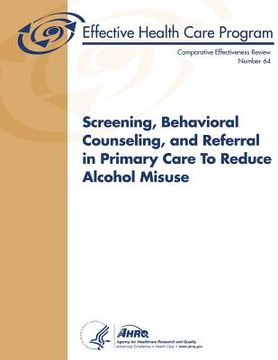Screening, Behavioral Counseling, and Referral in Primary Care to Reduce Alcohol Misuse: Comparative Effectiveness Review Number 64
Synopsis "Screening, Behavioral Counseling, and Referral in Primary Care to Reduce Alcohol Misuse: Comparative Effectiveness Review Number 64"
Alcohol misuse, which includes the full spectrum from drinking above recommended limits (i.e., risky/hazardous drinking) to alcohol dependence, is associated with numerous health and social problems and more than 85,000 deaths per year in the United States and an estimated annual cost to society of more than $220 billion. Alcohol misuse is estimated to be the third leading cause of preventable mortality in the United States following tobacco use and being overweight. Alcohol misuse contributes to a variety of conditions, including hypertension, cirrhosis, gastritis and gastric ulcers, pancreatitis, breast cancer, neuropathy, cardiomyopathy, anemia, osteoporosis, cognitive impairment, depression, insomnia, anxiety, and suicide. Excessive alcohol consumption is a major factor in injury and violence. Definitions of the spectrum of alcohol misuse (i.e., unhealthy alcohol use) continue to evolve. The National Institute on Alcohol Abuse and Alcoholism (NIAAA) has proposed epidemiologically based alcohol-use guidelines to limit risks for drinking-related consequences by establishing age- and sex-specific recommended consumption thresholds. This report's main objective is to conduct a systematic review of the effectiveness of screening followed by behavioral counseling, with or without referral, for alcohol misuse in primary care settings, addressing seven questions. This new review differs from the report on which the USPSTF 2004 recommendations were based in the following ways: We allowed inclusion of screening and behavioral interventions for the full spectrum of alcohol misuse, as long as subjects were identified by screening in a primary care or primary care-like setting; we added referral as an intervention of interest and changed the title to reflect this; we expanded the eligible settings from traditional primary care to also include settings with primary care-like relationships (e.g., infectious disease clinics for people with HIV); and we added additional outcomes of interest to our inclusion/exclusion criteria and analytic framework. Key Questions addressed by this review include: KQ 1: What is the direct evidence that screening for alcohol misuse followed by a behavioral counseling intervention, with or without referral, leads to reduced morbidity, reduced mortality, or changes in other long-term (6 months or longer) outcomes (e.g., health care utilization, sick days, costs, legal issues, employment stability)? KQ 2: How do specific screening modalities compare with one another for detecting alcohol misuse? KQ 3: What adverse effects are associated with screening for alcohol misuse and screening-related assessment? KQ 4a: How do behavioral counseling interventions, with or without referral, compare with usual care for improving intermediate outcomes for people with alcohol misuse as identified by screening? KQ 4b: How do specific behavioral counseling approaches, with or without referral, compare with one another for improving intermediate outcomes for people with alcohol misuse as identified by screening? KQ 5: What adverse effects are associated with behavioral counseling interventions, with or without referral, for people with alcohol misuse as identified by screening? KQ 6: How do behavioral counseling interventions, with or without referral, compare with one another and with usual care for reducing morbidity, reducing mortality, or changing other long-term (6 months or longer) outcomes (e.g., health care utilization, sick days, costs, legal issues, employment stability) for people with alcohol misuse as identified by screening? KQ 7: To what extent do health care system influences promote or hinder effective screening and interventions for alcohol misuse?

